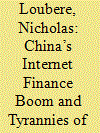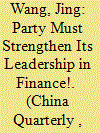| Srl | Item |
| 1 |
ID:
158293


|
|
|
|
|
| Summary/Abstract |
One of the main drivers of China’s e-commerce boom is the dramatic expansion of the country’s Internet finance industry, which has grown and diversified at a staggering rate over the past decade. The emergence of Chinese Internet finance has been discussed in largely positive terms as facilitating commercial activity. It has also been linked to the wider developmental goal of promoting financial inclusion through the provision of financial services to previously excluded populations. Emerging from the global microfinance movement, the concept of financial inclusion depicts increased access to financial services (particularly credit) as an inherently beneficial means of empowering the poor and driving bottom-up economic development. This article challenges this dominant narrative of beneficial digital financial inclusion in China. It draws on the growing body of literature critiquing the global financial inclusion movement, and examines examples of exploitation, fraud, instability, and extraction related to expanded digital financial coverage in contemporary China. It then demonstrates that digital financial inclusion is part and parcel of the Chinese government’s plans to create a social credit system in an attempt to construct a “trustworthy society.” In this way, digital financial inclusion can be seen as a key element in a wider project of expanding surveillance through big data in order to close down spaces for those seeking to contest the hegemonic socioeconomic order. The article argues that these examples illuminate fundamental processes implicit in the expansion of the commercial Internet finance industry. In this way, while the extension of digital financial inclusion in China benefits certain groups, it also necessarily serves to reproduce patterns of inequality and exploitation.
|
|
|
|
|
|
|
|
|
|
|
|
|
|
|
|
| 2 |
ID:
181140


|
|
|
|
|
| Summary/Abstract |
This article examines the roles digital technologies have played in propelling the shifts in modes of financial governance which have been led by the Chinese Communist Party and enacted by a wide spectrum of regulative actors. Based on analyses of the laws, policies and regulations surrounding digital financial technologies, or so-called fintechs, as well as in-depth interviews with government officials and fintech business executives, I argue that the proliferation of fintechs challenged the existing regulatory schemes defined by the Central Bank and the State Council. This forced a reconsideration of the Chinese government's hegemonic strategies in governing the rapidly changing financial industries. While digital technologies have been promoted to accomplish the goals set by the Party for financial marketization and modernization, a set of institutions including regulatory, organizational and normative rules have been developed to strengthen the Party's control over the digitization of finance. This contradiction is pivotal to understanding the Party's financial policymaking in the digital age.
|
|
|
|
|
|
|
|
|
|
|
|
|
|
|
|